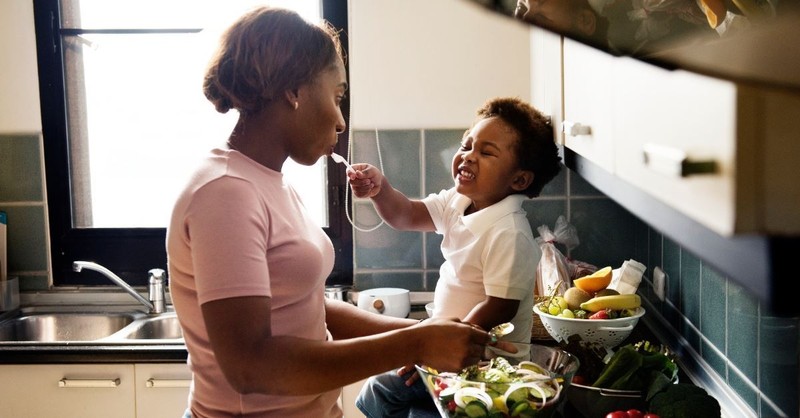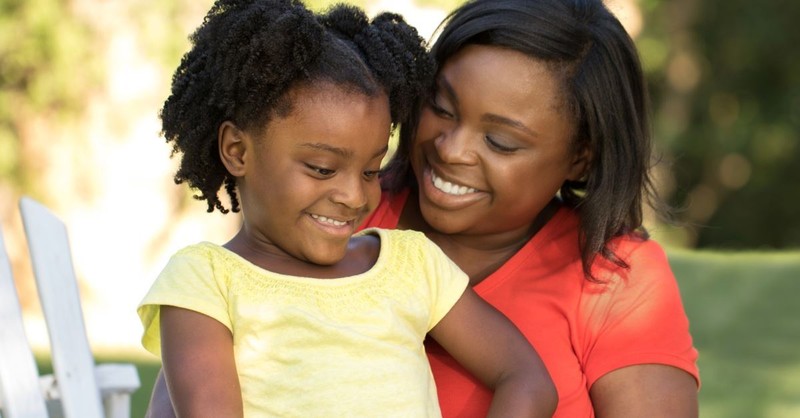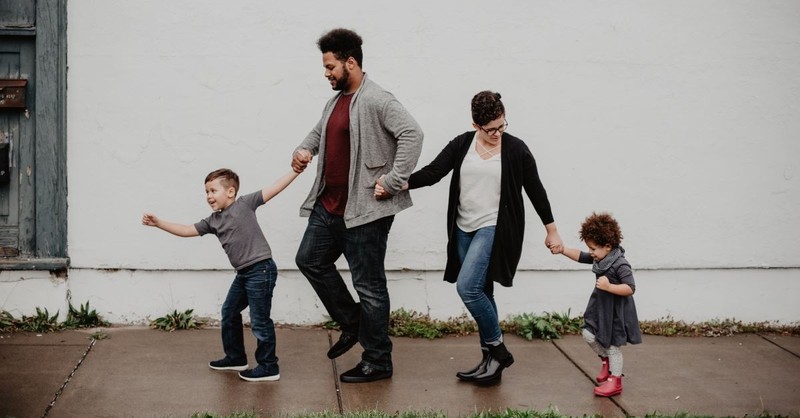
School has started for both my children and we’re spending much less time together. As a stay-at-home mom, we spent every day of this summer together, making memories. With the kids at school for most of the day, I’m thinking of ways to make the most of the time we do have when the kids are home. Like in any relationship, communication is of utmost importance with my kids. Now, with less time on our hands together, I’ve had to be really intentional about making sure our lines of communication are open and clear.
If you’re a parent who desires the same, here are 10 powerful tips to help you better communicate with your kids.
Photo Credit: Getty Images

1. Be present.
We’re probably the most distracted generation of parents to date. We have the world at our fingertips. I don’t think this is a bad thing, but it can be a distraction from creating healthy communication with our children. If we’re always tied to our laptops or glued to our phones, our children may not feel like they have the opportunity to approach us to communicate at all. Like anyone else, our kids want to know they are worth our undivided attention. They may not say that to you, but they very well may feel it. So when opportunities arise, like at the dinner table or before bedtime, be sure to unplug and be fully present.
Photo Credit: Getty Images

2. Be patient.
Some children take more time to open up than others. Getting them to communicate may take investing time with them and giving them the space they need to open up. If your child is an introvert, this is even more likely. If they aren’t chatty within 5 minutes give it time, let the awkward pauses pass, and don’t give up too soon.
Photo Credit: Dragon Images

3. Plan one-on-one time with each child.
Planning one-on-one time with your child may be a challenge, especially as you have more children, but it’s important to your communication with your child. One-on-one time doesn’t have to be complicated. Have one child wash the dishes with you or pick one child to run to the store with you. You can even allow older children to stay up at night a little later with you. Use this time talk without the interruption of siblings and to really lean into the conversation. You may notice that your children act completely different and may be more relaxed when it’s just the two of you.
Photo Credit: Getty Images

4. Make communication a regular part of your day.
It’s easy to get so in rhythm with everyday responsibilities that you just pass your family by, dropping them off at extracurricular activities and rushing to work. With full schedules, we have to accept the fact that healthy communication with our children will not happen by accident. It’s essential to be intentional to schedule time together. One good idea is to make one night out of the week family night where everyone commits to being home and present.
Photo Credit: Getty Images/yacobchuk

5. Ask good questions.
Instead of asking, “did you have a good day?” choose more open-ended questions that require more than a “yes” or “no” response. “What was the highlight of your day,” or “what was your favorite part of our vacation,” may get more of a response than closed-ended questions.
Photo Credit: Getty Images

6. Don’t only ask questions.
You want to promote conversation not conduct an interrogation. Be sure to share about yourself. Tell your kids about your experiences when you were their age and even share about mistakes you’ve made. Young kids tend to look up to their parents as superheroes. As flattering as this can be, this thought can potentially hurt communication as they get older. Knowing that you’ve been where they are now and that you are not perfect helps them to be more comfortable to open up and talk to you about their life and experiences.
Photo Credit: Getty Images/Martinan

7. Be a good listener.
Healthy communication comes from both sharing and listening. When your children do share with you, make a practice to listen well. Give them your undivided attention, look them in the eye, and even repeat what they said to ensure you heard and understand them correctly. This not only helps improve communication, but it also shows how much you care. When your kids feel you genuinely care about them and what they have to say, they will be more likely to share more comfortably in the future.
Photo Credit: Getty Images

8. Follow up.
When your child does communicate, don’t let it end there. Be sure to follow up later on what they shared. This shows you remembered what they said, and again, it shows you care.
Photo Credit: Getty Images

9. Schedule activities that promote communication.
Going to the movies and riding roller coasters are great activities to experience with our kids. However, they are not always conducive to conversation. Going out to eat or taking walks are other great activities to incorporate into your time together that allow for the space to chat and learn more about each other.
Photo Credit: Getty Images

10. Make memories worth talking about.
Give your kids something to talk about by going on adventures, living life together, and laughing a lot. When my kids are older, I want them to have plenty of memories to share, but that means making those memories today. Family trips and adventures are great ways to give your children something to talk about. Shared experiences also deepen bonds with your children, which further helps to develop healthy communication.
I don’t need to tell you how important communication is with your children. Sharing with our kids and listening to them is essential to their development and the health of the relationship. Healthy communication increases the influence and trust we have with our children to raise them in the way God is calling them. This is not something we should take lightly. The chat in the car on the way to practice, or the story shared at the dinner table are opportunities to help our kids develop and grow into the men and women God is calling them to be. It’s not always easy, but it’s worth it. Your kids are worth the effort, work, and intention it takes to develop healthy communication.
 Christina Patterson is a Bible teacher, author, and speaker passionate about empowering women in the love of Jesus Christ and the truth of God’s Word. Christina holds a Master’s degree in Theological Studies from Liberty University and is the founder of Beloved Women, a 501(c)3 non-profit providing resources and community for women to truly know who they are in Christ: His Beloved. She is also the author of several books, Bible Studies, and the creator of the LIFE Bible Journal that helps believers to intentionally study the Bible and apply God’s Word to their everyday lives. Connect with Christina at www.belovedwomen.org.
Christina Patterson is a Bible teacher, author, and speaker passionate about empowering women in the love of Jesus Christ and the truth of God’s Word. Christina holds a Master’s degree in Theological Studies from Liberty University and is the founder of Beloved Women, a 501(c)3 non-profit providing resources and community for women to truly know who they are in Christ: His Beloved. She is also the author of several books, Bible Studies, and the creator of the LIFE Bible Journal that helps believers to intentionally study the Bible and apply God’s Word to their everyday lives. Connect with Christina at www.belovedwomen.org.
Photo Credit: Pexels/Emma Bauso
Originally published Tuesday, 03 September 2019.









